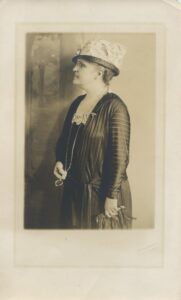 Annie Meyer (Feb. 19, 1867-Sept. 23, 1951) was born in New York City as a member of a pioneer Sephardic family descended from Rabbi Gershom Seixas, who assisted at the inauguration of George Washington. Her father was Robert Weeks Nathan and her mother was Annie August, a couple whose wealth was severely depleted by the Crash of 1873.
Annie Meyer (Feb. 19, 1867-Sept. 23, 1951) was born in New York City as a member of a pioneer Sephardic family descended from Rabbi Gershom Seixas, who assisted at the inauguration of George Washington. Her father was Robert Weeks Nathan and her mother was Annie August, a couple whose wealth was severely depleted by the Crash of 1873.
Home schooled, Meyer claimed to have read all the works of Charles Dickens by the age of 7. When she was 8, her family moved to Green Bay, Wisconsin, to pursue employment opportunities. At age 18, she enrolled in the Columbia College Collegiate Course for Women, which allowed women to sit for examinations, but not attend lectures at the all- male college. At the age of 20, she married physician Alfred Meyer., with whom she had a daughter, Margaret, who died of a gunshot wound when she was 29.
Meyer helped to found Barnard College for women in 1889 across the street from Columbia. Barnard became one of the Seven Sisters of women’s colleges in America. Meyer became an associate editor of Broadway Magazine and also edited Women’s Work in America. She also authored such works as Robert Annys: A Poor Priest (1901); The Dominant Sex (1911); The Dreamer: A Play in Three Acts (1912); Black Souls (1932) which dealt with lynchings in the South; Barnard Beginnings (1935) and It’s Been Fun: An Autobiography. (1951)
Her sister, Maud Nathan, was a suffragist, but Meyer said education, rather than the vote, should be the first objective of women. When she died, she had no survivors — Margaret, Maud, and Alfred having predeceased her. She left her estate to various charities, including a large amount to Montefiore Hospital, where Alfred had specialized in the treatment of tuberculosis.
Tomorrow, February 20: Roy Cohn
*
SDJW condensation of a Wikipedia article